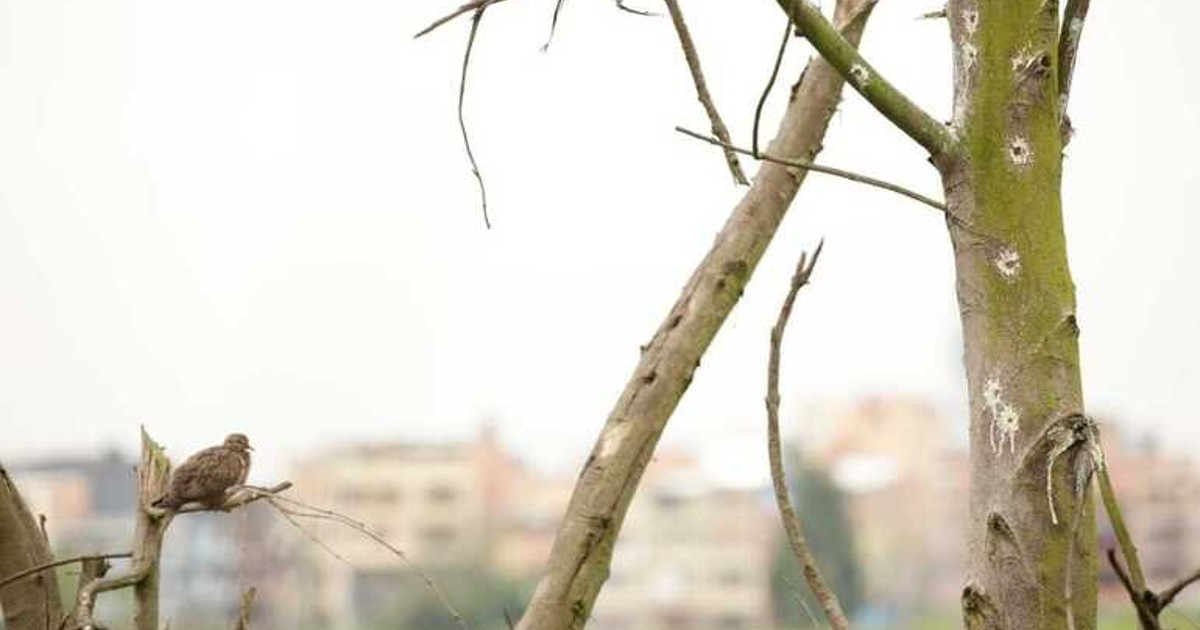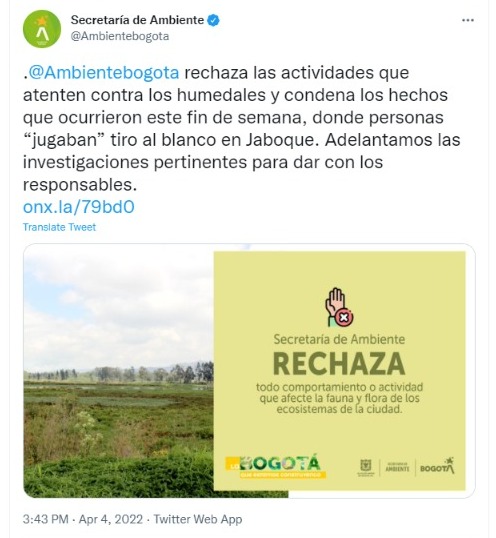
Through social networks, citizens of the town of Engativá denounced a group of people who were doing target shooting with a paintball gun in the Jaboque wetland, located west of Bogotá.
The Ministry of Environment indicated that it rejects any activity that threatens the wetlands of Bogotá, as such acts may cause damage to vegetation and disrupt wild, native and migratory animals in wetlands. In addition, the paint used in these practices, such as the game of paintball, can be toxic to some species that consumes it.
The environmental authority is carrying out the relevant investigations to find those responsible for the events that would have occurred this weekend in the Jaboque wetland.

These behaviors have penalties such as fines of up to 5,000 statutory monthly minimum wages in force, according to the environmental sanction process, as established by Law 1333 of 2009.
It may also constitute a crime against natural resources and the environment, and those found responsible may be imprisoned for between two to five years, and a fine of 100 to 50,000 statutory minimum monthly wages in force, following due process.
Finally, the District invited citizens to continue reporting any type of activity that affects any of the 17 recognized wetland reserves, through its service channels such as humedales@ambientebogota.gov.co, to line 123 or by informing the sector's Police.

During the Second High-Level Conference of the Americas on Illegal Trade in Wildlife, held in the department of Bolivar, with the participation of the United Kingdom and different Latin American countries, the Minister of Environment and Sustainable Development, Carlos Eduardo Correa, highlighted the importance of advancing concrete actions to deal with wildlife trafficking and called for awareness to achieve this common purpose.
The head of the environmental portfolio called for action to address this scourge that today affects the planet's biodiversity. “Today we are seeing a triple crisis in the world: climate change, loss of biodiversity and pollution. We are here to work on one of the actions that, if we unite together, will be lasting, and that is to stop the loss of biodiversity. We call for action, what are we going to do? We will all raise awareness, educate and work on the same purpose. We must teach citizens the natural heritage we have,” Correa said.
In addition, he stressed that Colombia has two valuable tools to combat the illegal trade in fauna and curb the loss of biodiversity: the Environmental Crimes Act, which criminalizes this crime with up to 12 years in prison, and Law 2153 of 2021, which created the Information, Registration and Monitoring System, which allows to control, prevent and prevent illegal trafficking of wild fauna and flora in Colombia.
KEEP READING:
Últimas Noticias
Debanhi Escobar: they secured the motel where she was found lifeless in a cistern
Members of the Specialized Prosecutor's Office in Nuevo León secured the Nueva Castilla Motel as part of the investigations into the case

The oldest person in the world died at the age of 119
Kane Tanaka lived in Japan. She was born six months earlier than George Orwell, the same year that the Wright brothers first flew, and Marie Curie became the first woman to win a Nobel Prize

Macabre find in CDMX: they left a body bagged and tied in a taxi
The body was left in the back seats of the car. It was covered with black bags and tied with industrial tape
The eagles of America will face Manchester City in a duel of legends. Here are the details
The top Mexican football champion will play a match with Pep Guardiola's squad in the Lone Star Cup

Why is it good to bring dogs out to know the world when they are puppies
A so-called protection against the spread of diseases threatens the integral development of dogs




